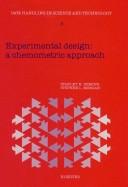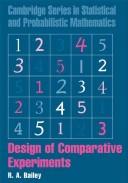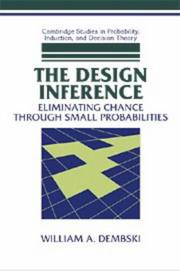| Listing 1 - 10 of 13 | << page >> |
Sort by
|
Book
ISBN: 0443151733 0443151741 9780443151743 9780443151736 Year: 2023 Publisher: Amsterdam, Netherlands ; Cambridge, MA : Elsevier,
Abstract | Keywords | Export | Availability | Bookmark
 Loading...
Loading...Choose an application
- Reference Manager
- EndNote
- RefWorks (Direct export to RefWorks)
This third edition of Design of Experiments for Engineers and Scientists adds to the tried and trusted tools that were successful in so many engineering organizations with new coverage of design of experiments (DoE) in the service sector. Case studies are updated throughout, and new ones are added on dentistry, higher education, and utilities. Although many books have been written on DoE for statisticians, this book overcomes the challenges a wider audience faces in using statistics by using easy-to-read graphical tools. Readers will find the concepts in this book both familiar and easy to understand, and users will soon be able to apply them in their work or research. This classic book is essential reading for engineers and scientists from all disciplines tackling all kinds of product and process quality problems and will be an ideal resource for students of this topic.
Experimental design. --- Research, Industrial. --- Plan d'expérience. --- Recherche industrielle. --- Experimental design --- Research, Industrial --- Scientific research.
Book
ISBN: 0124046819 9780124046818 1306930065 0124051863 9780124051867 Year: 2014 Publisher: London : Academic Press,
Abstract | Keywords | Export | Availability | Bookmark
 Loading...
Loading...Choose an application
- Reference Manager
- EndNote
- RefWorks (Direct export to RefWorks)
While there are many books available on statistical analysis of data from experiments, there is significantly less available on the design, development, and actual conduct of the experiments. Laboratory Experiments in the Social Sciences summarizes how to design and conduct scientifically sound experiments, be they from surveys, interviews, observations, or experimental methods. The book encompasses how to collect reliable data, the appropriate uses of different methods, and how to avoid or resolve common problems in experimental research. Case study examples illustrate how multiple
Social sciences --- Experimental design. --- Experiments. --- Sciences sociales --- Plan d'expérience --- Expériences. --- Plan d'expérience --- Expériences.

ISBN: 0444427341 9780444427342 9780080868301 0080868304 9786611781125 1281781126 Year: 1987 Volume: 3 Publisher: Amsterdam ; New York : New York, NY, U.S.A. : Elsevier ; Distributors for the U.S. and Canada, Elsevier Science Pub. Co.,
Abstract | Keywords | Export | Availability | Bookmark
 Loading...
Loading...Choose an application
- Reference Manager
- EndNote
- RefWorks (Direct export to RefWorks)
Now available in a paperback edition is a book which has been described as ``...an exceptionally lucid, easy-to-read presentation... would be an excellent addition to the collection of every analytical chemist. I recommend it with great enthusiasm.'' (Analytical Chemistry). Unlike most current textbooks, it approaches experimental design from the point of view of the experimenter, rather than that of the statistician. As the reviewer in `Analytical Chemistry' went on to say: ``Deming and Morgan should be given high praise for bringing the principles of experimental design to the level of the p
Analytical chemistry --- Chemometrics. --- Experimental design. --- Chemistry --- Design of experiments --- Statistical design --- Mathematical optimization --- Research --- Science --- Statistical decision --- Statistics --- Analysis of means --- Analysis of variance --- Mathematics --- Statistical methods --- Experiments --- Methodology --- Experimental design --- Chimie analytique --- Plan d'expérience --- Méthodes statistiques
Book
ISBN: 9780521862141 0521862140 9781139020879 9781139570695 1139570692 1139020870 9781139568883 1139568884 113957244X 9781139572446 1139931350 1316089088 1107253853 1283637618 1139569783 Year: 2012 Volume: 36 Publisher: Cambridge : Cambridge University Press,
Abstract | Keywords | Export | Availability | Bookmark
 Loading...
Loading...Choose an application
- Reference Manager
- EndNote
- RefWorks (Direct export to RefWorks)
This book is about the statistical principles behind the design of effective experiments and focuses on the practical needs of applied statisticians and experimenters engaged in design, implementation and analysis. Emphasising the logical principles of statistical design, rather than mathematical calculation, the authors demonstrate how all available information can be used to extract the clearest answers to many questions. The principles are illustrated with a wide range of examples drawn from real experiments in medicine, industry, agriculture and many experimental disciplines. Numerous exercises are given to help the reader practise techniques and to appreciate the difference that good design can make to an experimental research project. Based on Roger Mead's excellent Design of Experiments, this new edition is thoroughly revised and updated to include modern methods relevant to applications in industry, engineering and modern biology. It also contains seven new chapters on contemporary topics, including restricted randomisation and fractional replication.
Mathematical statistics --- Statistics --- Experimental design. --- Statistique --- Plan d'expérience --- Experimental design --- Mathematics --- Plan d'expérience --- Statistical decision. --- Decision problems --- Game theory --- Operations research --- Management science --- Design of experiments --- Statistical design --- Mathematical optimization --- Research --- Science --- Statistical decision --- Analysis of means --- Analysis of variance --- Experiments --- Methodology --- Research design

ISBN: 9780521683579 9780521865067 0521683572 0521865069 9780511611483 9780511394836 0511394837 0511394187 9780511394188 9780511392092 0511392095 9780511393402 0511393407 9786611370565 6611370560 051161148X 1107178568 9781107178564 1281370568 9781281370563 0511390874 9780511390876 Year: 2008 Publisher: Cambridge : Cambridge University Press,
Abstract | Keywords | Export | Availability | Bookmark
 Loading...
Loading...Choose an application
- Reference Manager
- EndNote
- RefWorks (Direct export to RefWorks)
This book should be on the shelf of every practising statistician who designs experiments. Good design considers units and treatments first, and then allocates treatments to units. It does not choose from a menu of named designs. This approach requires a notation for units that does not depend on the treatments applied. Most structure on the set of observational units, or on the set of treatments, can be defined by factors. This book develops a coherent framework for thinking about factors and their relationships, including the use of Hasse diagrams. These are used to elucidate structure, calculate degrees of freedom and allocate treatment subspaces to appropriate strata. Based on a one-term course the author has taught since 1989, the book is ideal for advanced undergraduate and beginning graduate courses. Examples, exercises and discussion questions are drawn from a wide range of real applications: from drug development, to agriculture, to manufacturing.
Experimental design --- Plan d'expérience --- Plan d'expérience --- Experimental design. --- Mathematical statistics. --- Mathematics --- Statistical inference --- Statistics, Mathematical --- Statistics --- Probabilities --- Sampling (Statistics) --- Design of experiments --- Statistical design --- Mathematical optimization --- Research --- Science --- Statistical decision --- Analysis of means --- Analysis of variance --- Statistical methods --- Experiments --- Methodology

ISBN: 0521623871 0521678676 1139930605 0511891415 0511971559 1139939327 0511570643 1139929593 1139933817 1139937014 9780511570643 9781461958598 1461958598 9780521623872 9780521678674 Year: 1998 Publisher: Cambridge : Cambridge University Press,
Abstract | Keywords | Export | Availability | Bookmark
 Loading...
Loading...Choose an application
- Reference Manager
- EndNote
- RefWorks (Direct export to RefWorks)
The design inference uncovers intelligent causes by isolating their key trademark: specified events of small probability. Just about anything that happens is highly improbable, but when a highly improbable event is also specified (i.e. conforms to an independently given pattern) undirected natural causes lose their explanatory power. Design inferences can be found in a range of scientific pursuits from forensic science to research into the origins of life to the search for extraterrestrial intelligence. This challenging and provocative 1998 book shows how incomplete undirected causes are for science and breathes new life into classical design arguments. It will be read with particular interest by philosophers of science and religion, other philosophers concerned with epistemology and logic, probability and complexity theorists, and statisticians.
Experimental design. --- Probabilities. --- Experimental design --- Probabilities --- Plan d'expérience --- Probabilités --- Probability --- Statistical inference --- Design of experiments --- Statistical design --- Combinations --- Mathematics --- Chance --- Least squares --- Mathematical statistics --- Risk --- Mathematical optimization --- Research --- Science --- Statistical decision --- Statistics --- Analysis of means --- Analysis of variance --- Experiments --- Methodology --- Arts and Humanities --- Philosophy --- Intelligent design (Teleology)
Book
ISBN: 9781107698000 9781107017665 9781139084444 1107698006 1107017661 9781139552134 1139552139 9781139549639 1139549634 1139084445 9781139555845 1139555847 1316089665 1139564439 113955459X 1283637499 1139550888 Year: 2012 Publisher: Cambridge : Cambridge University Press,
Abstract | Keywords | Export | Availability | Bookmark
 Loading...
Loading...Choose an application
- Reference Manager
- EndNote
- RefWorks (Direct export to RefWorks)
This unique book is the first comprehensive guide to the discovery, analysis, and evaluation of natural experiments - an increasingly popular methodology in the social sciences. Thad Dunning provides an introduction to key issues in causal inference, including model specification, and emphasizes the importance of strong research design over complex statistical analysis. Surveying many examples of standard natural experiments, regression-discontinuity designs, and instrumental-variables designs, Dunning highlights both the strengths and potential weaknesses of these methods, aiding researchers in better harnessing the promise of natural experiments while avoiding the pitfalls. Dunning also demonstrates the contribution of qualitative methods to natural experiments and proposes new ways to integrate qualitative and quantitative techniques. Chapters complete with exercises and appendices covering specialized topics such as cluster-randomized natural experiments, make this an ideal teaching tool as well as a valuable book for professional researchers.
Social sciences --- Experimental design --- Experiments --- Research --- Experiments. --- Expériences --- Plan d'expérience --- Expériences --- Methods in social research (general) --- Experimental design. --- Sciences sociales --- Research. --- Recherche --- Experiment. --- Sozialwissenschaften. --- Social science research --- Design of experiments --- Statistical design --- Mathematical optimization --- Science --- Statistical decision --- Statistics --- Analysis of means --- Analysis of variance --- Methodology --- Science research --- Scientific research --- Information services --- Learning and scholarship --- Research teams --- Design. --- Methodology. --- Social Sciences --- Political Science --- Social sciences - Experiments --- Social sciences - Research

ISBN: 0761973834 9780761973836 0761973826 9780761973829 Year: 2003 Publisher: London ; Thousand Oaks, Calif. : Sage publications Ltd.,
Abstract | Keywords | Export | Availability | Bookmark
 Loading...
Loading...Choose an application
- Reference Manager
- EndNote
- RefWorks (Direct export to RefWorks)
Contents PART ONE: DESIGNING AN EXPERIMENT >Before You Begin > Planning an Experiment > Experimental Designs PART TWO: ANALYZING AND INTERPRETING DATA > Descriptive Statistics > Inferential Statistics > Parametric Tests > Non-Parametric Tests > Choosing a Statistical Test PART THREE: WRITING UP YOUR RESEARCH > A Quick Guide to Writing a Psychology Lab-Report > General Points When Writing a Report > Answering the Question 'Why?' The Introduction Section > Answering the Question 'How?' The Method Section > Answering the Question 'What Did I Find?' The Results Section > Answering the Question 'So What?' The Discussion Section > Title, Abstract, Reference and Formatting > Example of an Experimental Write-up How to Design and Report Experiments is the perfect textbook and guide to the often bewildering world of experimental design and statistics. It provides a complete map of the entire process beginning with how to get ideas about research, how to refine your research question and the actual design of the experiment, leading on to statistical procedure and assistance with writing up of results. While many books look at the fundamentals of doing successful experiments and include good coverage of statistical techniques, this book very importantly considers the process in chronological order with specific attention given to effective design in the context of likely methods needed and expected results. Without full assessment of these aspects, the experience and results may not end up being as positive as one might have hoped. Ample coverage is then also provided of statistical data analysis, a hazardous journey in itself, and the reporting of findings, with numerous examples and helpful tips of common downfalls throughout. Combining light humour, empathy with solid practical guidance to ensure a positive experience overall, How to Design and Report Experiments will be essential reading for students in psychology and those in cognate disciplines with an experimental focus or content in research methods courses.
Science --- Methods in social research (general) --- Mathematical statistics --- Experimental design. --- Experimental design --- Wetenschappelijk onderzoek --- Psychologie. --- Psychology, Experimental --- Plan d'expérience --- Psychologie expérimentale --- Methodology. --- Méthodologie --- 519.2 --- 301.08 --- #SBIB:303H0 --- Wiskundige statistiek --- Sociologische onderzoeksmethoden (algemeen) --- Methoden in de sociale wetenschappen: algemeen --- Design of experiments --- Statistical design --- Mathematical optimization --- Research --- Statistical decision --- Statistics --- Analysis of means --- Analysis of variance --- Experiments --- Methodology --- #KVHB:Statistiek --- #KVHB:Wetenschappelijk onderzoek

ISBN: 9780387759654 9780387759647 0387759646 0387759654 9781441926142 1441926143 Year: 2008 Publisher: New York, NY : Springer New York : Imprint: Springer,
Abstract | Keywords | Export | Availability | Bookmark
 Loading...
Loading...Choose an application
- Reference Manager
- EndNote
- RefWorks (Direct export to RefWorks)
Although statistical design is one of the oldest branches of statistics, its importance is ever increasing, especially in the face of the data flood that often faces statisticians. It is important to recognize the appropriate design, and to understand how to effectively implement it, being aware that the default settings from a computer package can easily provide an incorrect analysis. The goal of this book is to describe the principles that drive good design, paying attention to both the theoretical background and the problems arising from real experimental situations. Designs are motivated through actual experiments, ranging from the timeless agricultural randomized complete block, to microarray experiments, which naturally lead to split plot designs and balanced incomplete blocks. George Casella is Distinguished Professor in the Department of Statistics at the University of Florida. He is active in many aspects of statistics, having contributed to theoretical statistics in the areas of decision theory and statistical confidence, to environmental statistics, and has more recently concentrated efforts in statistical genomics. He also maintains active research interests in the theory and application of Monte Carlo and other computationally intensive methods. He is listed as an ISI "Highly Cited Researcher." In other capacities, Professor Casella has served as Theory and Methods Editor of the Journal of the American Statistical Association, 1996-1999, Executive Editor of Statistical Science, 2001-2004, and Co-Editor of the Journal of the Royal Statistical Society, Series B, 2009-2012. He has served on the Board of Mathematical Sciences of the National Research Council, 1999-2003, and many committees of both the American Statistical Association and the Institute of Mathematical Statistics. Professor Casella has co-authored five textbooks: Variance Components, 1992; Theory of Point Estimation, Second Edition, 1998; Monte Carlo Statistical Methods, Second Edition, 2004; Statistical Inference, Second Edition, 2001, and Statistical Genomics of Complex Traits, 2007.
Human genetics --- medische genetica --- Zoomorphology. Zooanatomy --- systematische plantkunde --- Statistical science --- genetica --- zoölogie --- statistisch onderzoek --- Plant physiology. Plant biophysics --- morfologie --- Experimental design --- Plan d'expérience --- EPUB-LIV-FT LIVSTATI SPRINGER-B --- Experimental design. --- Mathematical statistics. --- Human genetics. --- Plant genetics. --- Morphology (Animals). --- Statistical Theory and Methods. --- Human Genetics. --- Plant Genetics and Genomics. --- Animal Anatomy / Morphology / Histology. --- Animal morphology --- Animals --- Body form in animals --- Zoology --- Morphology --- Plants --- Genetics --- Heredity, Human --- Human biology --- Physical anthropology --- Mathematics --- Statistical inference --- Statistics, Mathematical --- Statistics --- Probabilities --- Sampling (Statistics) --- Statistical methods --- Statistics . --- Animal anatomy. --- Statistical analysis --- Statistical data --- Econometrics --- Animal anatomy --- Biology --- Physiology --- Anatomy

ISBN: 0387562087 0387098402 9786612829314 0387098410 1282829319 Year: 2010 Volume: 21 Publisher: New York, NY : Springer US : Imprint: Springer,
Abstract | Keywords | Export | Availability | Bookmark
 Loading...
Loading...Choose an application
- Reference Manager
- EndNote
- RefWorks (Direct export to RefWorks)
Principles of Diabetes Mellitus, Second Edition is an important update to the comprehensive textbook first published in 2002 and reissued in 2004. It is written for physicians of all specialties who, on a daily basis, deal with an illness which has reached epidemic proportions. The book is also intended for medical students and investigators of all aspects of diabetes. The last five years have witnessed major developments in our understanding of diabetes and in therapeutic approaches to this disease. Thus, in addition to updating all chapters, the authors added eight new chapters to the second edition. Principles of Diabetes Mellitus, Second Edition covers diabetes in all of its aspects—genetics, epidemiology, pathophysiology, clinical manifestations, therapy and prevention.
Diabetes Mellitus -- Treatment. --- Diabetes Mellitus. --- Diabetes. --- Diabetes --- Endocrine System Diseases --- Glucose Metabolism Disorders --- Diabetes Mellitus --- Diseases --- Metabolic Diseases --- Nutritional and Metabolic Diseases --- Medicine --- Clinical Endocrinology --- Health & Biological Sciences --- Carbohydrate intolerance. --- Brittle diabetes --- Diabetes mellitus --- IDDM (Disease) --- Insulin-dependent diabetes --- Ketosis prone diabetes --- Type 1 diabetes --- Systèmes, Identification des --- Systèmes, Identification des --- Medicine. --- Cardiology. --- Endocrinology. --- Primary care (Medicine). --- Medicine & Public Health. --- Primary Care Medicine. --- Carbohydrate intolerance --- Endocrine glands --- Diabetic acidosis --- Glycosylated hemoglobin --- Food intolerance --- System identification. --- Experimental design. --- Experimental design --- System identification --- Plan d'expérience --- Emergency medicine. --- Heart --- Internal medicine --- Medicine, Emergency --- Critical care medicine --- Disaster medicine --- Medical emergencies --- Hormones --- Endocrinology . --- Primary medical care --- Medical care
| Listing 1 - 10 of 13 | << page >> |
Sort by
|

 Search
Search Feedback
Feedback About
About Help
Help News
News